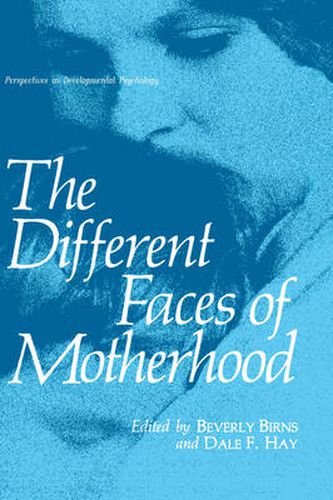Readings Newsletter
Become a Readings Member to make your shopping experience even easier.
Sign in or sign up for free!
You’re not far away from qualifying for FREE standard shipping within Australia
You’ve qualified for FREE standard shipping within Australia
The cart is loading…






This title is printed to order. This book may have been self-published. If so, we cannot guarantee the quality of the content. In the main most books will have gone through the editing process however some may not. We therefore suggest that you be aware of this before ordering this book. If in doubt check either the author or publisher’s details as we are unable to accept any returns unless they are faulty. Please contact us if you have any questions.
The Different Faces of Motherhood began during a conversation between the two editors, developmental psychologists who have spent our professional careers working with infants and very young children. We are well aware of the impor tance of infants to their mothers and of mothers to their infants. However, we were particularly aware of the fact that, whereas our knowledge about infants increases exponentially . each decade, our assumptions about mothers change relatively little. We were concerned about the theories that underlie the advice given to mothers and also about the assumption that mothers appear to be generic. More and more we have learned about individual differences in babies, but not more and more about individual differences in mothers. Our second concern has been to expand our knowledge about mothers. Our assumptions were few and our questions were many. We believed that the experience of women would vary greatly, both in outlook and in behavior, depending on each woman’s age, marital status, finan Cial status, ethnicity, health, education and work experience, as well as a wom an’s own experience in her family origin and her relationship to her husband. If we are to understand child development and believe that the early years are important in a child’s life, then it seems critical to examine our beliefs about mothers. If we are to understand human development, then being a mother is surely an important area of inquiry.
$9.00 standard shipping within Australia
FREE standard shipping within Australia for orders over $100.00
Express & International shipping calculated at checkout
Stock availability can be subject to change without notice. We recommend calling the shop or contacting our online team to check availability of low stock items. Please see our Shopping Online page for more details.
This title is printed to order. This book may have been self-published. If so, we cannot guarantee the quality of the content. In the main most books will have gone through the editing process however some may not. We therefore suggest that you be aware of this before ordering this book. If in doubt check either the author or publisher’s details as we are unable to accept any returns unless they are faulty. Please contact us if you have any questions.
The Different Faces of Motherhood began during a conversation between the two editors, developmental psychologists who have spent our professional careers working with infants and very young children. We are well aware of the impor tance of infants to their mothers and of mothers to their infants. However, we were particularly aware of the fact that, whereas our knowledge about infants increases exponentially . each decade, our assumptions about mothers change relatively little. We were concerned about the theories that underlie the advice given to mothers and also about the assumption that mothers appear to be generic. More and more we have learned about individual differences in babies, but not more and more about individual differences in mothers. Our second concern has been to expand our knowledge about mothers. Our assumptions were few and our questions were many. We believed that the experience of women would vary greatly, both in outlook and in behavior, depending on each woman’s age, marital status, finan Cial status, ethnicity, health, education and work experience, as well as a wom an’s own experience in her family origin and her relationship to her husband. If we are to understand child development and believe that the early years are important in a child’s life, then it seems critical to examine our beliefs about mothers. If we are to understand human development, then being a mother is surely an important area of inquiry.